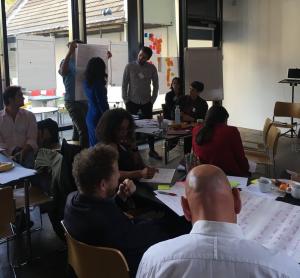You are here
- Home
- blog_categories
- Fairness and Financial Markets
- How a force for good is tackling poverty
How a force for good is tackling poverty
6 November 2018

By Jonquil Lowe, Senior Lecturer in Economics and Personal Finance
Throwing a ball of wool around the room to form a visible network between the 30 or so people present was just one of the techniques used by the Finance Innovation Lab to create the right mood for generating ideas to tackle the poverty premium at its recent ‘ideation’ event (18 October 2018).
The ‘poverty premium’ refers to the extra money that people on low-incomes have to pay for everyday financial and household services. These include, for example, having to pay over-the-odds for fuel through pre-payment meters, paying more for car and home insurance because poorer neighbourhoods are rated as higher risk, and borrowing at high cost if the washing machine needs replacing. According to Fair by Design, there are in fact 29 different elements to the poverty premium and together they cost low-income households, covering 14 million people, an average of £490 a year.
This price tag simply for being poor is often the result of the way financial products and services have been designed, as highlighted in my co-authored report, Access to Financial Services in the UK, in 2016. We have been lulled into thinking it is logical that firms should charge more if their chosen metrics show customers are higher risk for credit or insurance, or turn them away if the firm’s business model shows they would be unprofitable. But it doesn’t have to be that way.
Finance Innovation Lab is on a mission to harness finance for good. Founded in 2009, it aims to change the financial system to serve people and the planet. It is doing this, in part, by regularly bringing together civic societies (like Fair by Design), regulators, existing financial providers, fintech start-ups and independent researchers, such as academics. Which is how I found myself throwing a ball of wool across to the founder of a fintech that helps people get free from bank loans and overdrafts. Elifinity buys the loans of customers that banks don’t want at 30% of the outstanding debt. But instead of chasing the customer for full repayment, it seeks just the 30% and actively provides support and time for them to get their finances back on an even keel.
Meanwhile, the Centre for Responsible Credit is looking at ways of getting social landlords to allow their tenants to make flexible rent payments to help them cope with crunch events like Christmas and so avoid racking up costly debt.
The aim of the ideation event was to stimulate more great ideas. Among others, I was teamed up with Neil, the founder of CreditSpring, a fintech that offers small interest-free loans in return for an annual fee, turning risk-based credit into a sort of mutual insurance against unexpected expenses. Our team came up with a way for small communities to band together and use their collective purchasing power to get better deals from energy and insurance providers.
The great thing about Finance Innovation Lab is that this is not just a talking shop. It brings together ideas and people who can make it happen, and through its fellowship scheme supports fintechs who share its aim of making finance a force for good.
Photo: Finance Innovation Lab on Twitter - "Our design teams have just pitched their top ideas for tackling the #povertypremium - including collective purchasing and bargaining for household and financial products, alternative credit ratings and AI-powered apps for securing great deals. #LabFellowship"
Share this page:
Contact us
To find out more about our work, or to discuss a potential project, please contact:
International Development Research Office
Faculty of Arts and Social Sciences
The Open University
Walton Hall
Milton Keynes
MK7 6AA
United Kingdom
T: +44 (0)1908 858502
E: international-development-research@open.ac.uk
.jpg)